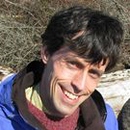Academic Editors
The following people constitute the Editorial Board of Academic Editors for PeerJ. These active academics are the Editors who seek peer reviewers, evaluate their responses, and make editorial decisions on each submission to the journal. Learn more about becoming an Editor.

Jay D Evans
Lead Scientist for the US Dept. Agriculture Bee Research Laboratory. Recipient of 2011 Hambleton Award for Bee Research and 2002 ARS Early Career Scientist-BA Award, member i5k Insect Genome Planning Committee.

Gerald T Mangine
Dr. Mangine recieved his doctorate from the University of Central Florida under the guidance of Dr. Jay Hoffman and Dr. Jeffrey Stout. Currently, he is an Assistant Professor in the Department of Exercise Science and Sport Management at Kennesaw State University. His primary research focus is on resistance training adaptations and predicting sports performance.

Mirna Mourtada-Maarabouni
I was appointed at Keele as a Lecturer in the School of Life Sciences in August 2009. Prior to this, I obtained a first class BSc (Hons) in Biochemistry in 1995 and a PhD in cellular pharmacology in 1998, both from Keele. My research so far involved identifying and studying novel molecules involved in apoptosis.

Alessandro L Colosio
I am a Junior Professor at the Jean Monnet University of Saint-Etienne (France), with an interest in oxygen consumption kinetics (i.e. slow component), exercise monitoring & prescription, and the underpinnings of exercise (in)tolerance both in healthy and pathological populations. I also work as S&C coach with Belgian Olympic athletes and am interested in resistance training in the field and lab.

Beth Jefferies
Beth is a Professor of Psychology at the University of York, UK. Her research seeks to understand the neural basis of semantic cognition and language, and disorders affecting these aspects of cognition. She uses multiple neuroscientific methods, including neuropsychology, neuroimaging (MEG, fMRI) and brain stimulation to investigate how concepts are represented and flexibly retrieved.
Outstanding Doctoral Research Contributions to Psychology (2004)
Elizabeth Warrington Prize - British Neuropsychological Society (2008)
Cortex Prize - Federation of European Societies of Neuropsychology (2010)

Emmanuel Nene Odjidja
Emmanuel Nene Odjidja is an epidemiologist and public health consultant. He obtained his MSc degree in Global Health from the Queen Margaret University in Edinburgh and is currently interested in control of infectious diseases during pregnancy and understanding the linkages between diet-induced inflammation and the onset of cardiometabolic risks and diseases.

Stefano S.K. Kaburu
Dr Kaburu is currently a Senior Lecturer in Conservation Biology at Nottingham Trent University, in the UK. Dr Kaburu completed his PhD in Anthropology in 2014 at the School of Anthropology and Conservation of the University of Kent in the UK, during which he studied grooming behaviour and cooperation in wild chimpanzees.
In 2014-2015, he was a post-doc in Dr Stephen Suomi’s Laboratory of Comparative Ethology, at the National Institutes of Health in the US where he examined the development of social cognition in infant rhesus macaques. Between 2016 and 2018 he was a post-doctoral fellow in Dr Brenda McCowan’s Laboratory at the School of Veterinary Medicine of the University of California in Davis, during which he studied the drivers and outcome of human-macaque interactions in Northern India.
His main areas of research interests are animal (especially primates) social behaviour and conservation, human-wildlife interactions and infant development

Alexey Kabalnov
Ph. D., Moscow State University, Moscow, Russia, 1985. Russian Academy of Sciences, 1986-1991. Senior Research Scientist, Hewlett Packard Company, 1998- current. Langmuir, Advisory Board Member, 2001- 2005. Journal of Dispersion Science and Technology, Advisory Board Member, 2001- 2005.

Enrique Mateos Naranjo
Assistant Professor of Plant Biology and Ecology, University of Seville (Spain). Past postdoctoral researcher activities at School of Biological Sciences (University of East Anglia, UK), Faculty of Biology (University Illes Balears, Spain) and Faculty of Agronomic Sciences (University Nacional de Rosario, Argentina). Past PhD student at University of Seville (Spain).

Robert Fruscio
Associate Professor of Obstetrics and Gynecology of the University of Milan-Bicocca, in Monza, Italy and staff physician in the general Gynecological Unit of San Gerardo Hospital. Before MD graduation and during the residency in Obstetrics and Gynecology he conducted an intense preclinical research activity at Mario Negri Institute (Milan) and at Massachusetts General Hospital (Boston). In 2010 he acquired a PhD in Gynecologic Oncology. His research interests are focused on molecular biology of ovarian cancer, and on prevention and treatment of gynecological malignancies.
2001: Degree in Medicine and Surgery
2006: Specialization in Obstetrics and Gynecology
2010: PhD in Gynecologic Oncology
2014: Associate Professor in Obstetrics and Gynecology

Carlos Gutiérrez
Carlos Gutiérrez, DVM (Córdoba, 1986), diplomate in Public Health (Madrid, 1988), PhD (Las Palmas, 1995), Master in Public Health (Las Palmas, 2003), University Expert in Biostatistics (Madrid, 2006), diplomate European College Small Ruminant Health Management (-ECSRHM-Brussels, 2013), is currently Full Professor at Research Institute of Biomedical and Health Sciencies/School of Veterinary Science, University of Las Palmas de Gran Canaria.
He has developed several projects, collaborations and training periods in the Institute of Tropical Medicine (Antwerp, Belgium), Swiss Tropical and Public Health (Basel, Switzerlandor) or Vlaam Biotchnology Institute (Brussels, Belgium).
He has particular interest on animal tropical diseases (trypanosomosis in special) as well as biomedical applications of nanobodies (VHH). Currently he is an active member of different international committees like ad-hoc OIE group on non tse-tse transmitted animal trypanosomes (OIE, Paris), Camel Section of the European Federation of Animal Science (EAAP, Roma) or Teaching committee of the ECSRHM (Brussels) and belongs to several Societies like New York Academy of Sciences or National Geographic Society.

Jonathan F. Colville
I am interested in the distribution and diversity patterns of insects and the reasons underlying observed patterns. I study both point diversity and compositional differences in insect and plant community patterns and relate these to ecological and evolutionary processes. I am also interested in the evolution of exaggerated traits in insects, such as those traits associated with sexual selection. The functional morphology of insect mouthparts, particularly of insect pollinators, are a further area of interest, as is the systematics and taxonomy of beetles (Scarabaeidae).

